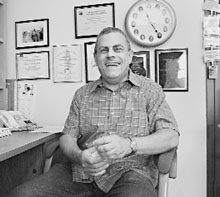By Deborah Lynn Blumberg
Only a handful of Morgan Stanley Dean Witter’s employees died in the Sept. 11, 2001 World Trade Center attacks, in part due to the company’s well-organized disaster plan and insistence on conducting its own evacuation drills, experts later testified in public hearings on the terrorist attacks.
If more companies were just as prepared for similar tragedies and disasters, perhaps fewer lives would be lost. That’s what a group of students from Downtown’s Metropolitan College of New York hope to ensure after graduating in April with the first degree of its kind in New York State — a masters of public administration in emergency and disaster management.
“Most places just have a fire plan and they don’t even fully practice it, they don’t actually go down the stairwells,” said professor Mick Maurer, a former Army psychologist who runs the new yearlong program.
So in a small classroom on Varick St. at Canal, seven students are giving up their weekends with the goal of eventually helping other companies, businesses and schools produce and practice effective disaster plans. Every Saturday and Sunday students meet to discuss topics such as the financial impact of disasters, terrorism, and how to best manage hurricanes, earthquakes and floods.
In the past, most consultants who help create safety manuals have been former military personnel with an expertise mainly in man-made disasters, Maurer said. But programs like Metropolitan’s are changing the field — making it more diverse by including civilians who are equipped to manage both man-made and natural disasters.
Twenty other states currently offer a masters degree or graduate level certificate program in emergency and disaster management. Maurer said the Federal Emergency Management Agency is advising all of the programs so that they are uniform.
“This is a new and upcoming field and there’s a lot of area for it to grow,” said Karen Bull, 45, one of the seven students. “When there are hazardous or emergency events, as an emergency planner you can help those who are most vulnerable.”
While in the program, Bull also works full time for the Department of Education as a substance abuse prevention intervention specialist in several Brooklyn schools. Like the other students, for her final project Bull will create a disaster plan for her organization — in her case, a school.
“Being in this program I can see the opportunity to enhance the plan,” she said, “especially after Sept. 11.”
The terrorist attacks have influenced other students as well. Derek Powers, 50, a N.Y.P.D. commanding officer with Brooklyn night watch, stood on the Brooklyn side of the Brooklyn Bridge after the towers fell and watched New Yorkers covered in white soot cross the bridge.
“I saw little coordination and realized that in terms of preparedness we’re not really ready — the city, the country,” he said. “I know I’m an old man, but I figure I can hang around for a little while and lend my expertise. So far the program has been very fulfilling.”
Olymar Alsina, 27, who now teaches high school science during the week, worked part-time in the W.T.C. at the time of the attacks. “The magnitude of the loss deeply affected me,” she said. “It really hit home and was an eye-opener. We have some major holes [in emergency planning].”
Netanya Aberra, who is in his mid 30s, has taken time off from his job as an emergency medical technician in the Bronx to enroll in the program. “If you’re in the emergency field, this degree seems to be a natural next step,” he said. “You get to see emergency care from a management point of view.”
After graduating from the program in April, Aberra said he may apply to medical school where he would sub-specialize in disaster medicine. Another possibility is enrolling in Metropolitan’s new masters of science in homeland security, a degree that administrators are still planning and hope to begin in the fall.
This degree will include an optional trip to Israel, Maurer said.
“I understand they have a very efficient system, so it makes a lot of sense for us to go there,” Aberra said.
On a recent Saturday morning student Matt Khaled, 23, lectured his economic impact class on the cost of droughts, weaving in stories of Joseph from the Bible, who redirected grains in Egypt — Khaled called him the first emergency planner — and informing students about New York’s emergency water pump in Chelsea.
“We try to be economists in this class [and look at] the financial cost of personal injury and death,” said the course’s professor, Jasmina Spasojevic. “What is a human life worth?”
Next fall the school, formerly called Audrey Cohen College, expects 15 students will enroll in the program. Current students are proud to be the first in New York to graduate with the degree.
“We have a social responsibility in our ability to minimize the damage of a disaster,” Alsina said. “I think this graduating class will have a lot of opportunities.”
Mick Maurer, a former Army psychologist, runs Metropolitan College’s new masters program in emergency and disasters management.
WWW Downtown Express
Also Read: https://www.amny.com/news/fahrenheit-asks-right-questions-2/





























